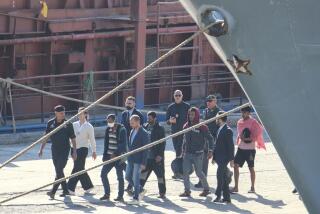51 Albanians Fly to Czech Capital; Thousands Await Chance to Flee : Eastern Europe: The exodus begins from the region’s last bastion of Stalinism. It may signal a softening by the hard-line regime in Tirana.
- Share via
BUDAPEST, Hungary — The first of more than 6,000 Albanian asylum-seekers flew to freedom in Czechoslovakia on Monday after besieging foreign embassies in Tirana in a desperate bid to escape Eastern Europe’s last bastion of Stalinism.
The Czechoslovak Foreign Ministry in Prague sent President Vaclav Havel’s plane to evacuate 51 Albanians from Tirana. The plane arrived back in Prague early today, and the 51 were greeted at the airport by Foreign Minister Jiri Dienstbier, who had negotiated their release.
Release of the asylum-seekers by what has been Europe’s most isolated dictatorship could signal a new willingness for compromise within the leadership of Albanian President Ramiz Alia.
The incident also confirmed the spread of a democratic fever that liberated the rest of Eastern Europe last year to one of the Continent’s darkest corners.
French Foreign Ministry officials in Paris said preparations were nearly complete for transport of the 550 refugees at their Albanian embassy, and thousands of others are expected to leave 10 other missions as soon as exit documents can be arranged.
Albanians, frustrated with the lack of reform in their rigid and impoverished nation, forced their way into embassies in Tirana since June 28, demanding safe passage out of the country. Security forces have sealed off Tirana’s Embassy Row to prevent more Albanians from scrambling over fences and crashing through gates to gain entry to the foreign missions.
The crackdown followed a demonstration last Friday, when 10,000 Albanians converged in a pro-democracy rally that was believed to be the largest outbreak of unrest in Tirana since the hard-line socialist state was proclaimed after World War II.
Apparently spurred by the protest and growing signs of a restless public, Alia demoted his interior minister and other key figures who Western diplomats considered to be obstacles to reform. On Monday, the food and light industry ministers were sent into retirement, and two other top figures responsible for economic affairs were reassigned.
The changes indicate a new concern in the leadership over widespread consumer shortages and one of Europe’s lowest standards of living.
The success of the first wave of refugees in winning escape from Albania could encourage others to appeal to Western diplomats for help, as occurred a year ago when East Germans pushed their way West through the holes bored by Hungary through the Iron Curtain.
Albania, a Balkan nation of 3.2 million wedged between Greece and Yugoslavia on the Adriatic coast, was the only Eastern European state untouched by last year’s spread of democratic revolution through the region.
But foreign envoys say Albanians have learned of the new freedoms accorded their East European neighbors through Yugoslav and Italian television broadcasts.
Alia’s government announced in April that it would relax restrictions on foreign travel and seek to improve relations with Western countries, including restoration of diplomatic ties with the United States. But Albanian authorities have indicated they plan to retain a traditional socialist leadership.
Albania had become increasingly isolated because of its allegiance to the Stalinist foundation built during the 40-year leadership of Enver Hoxha, who died in 1985 and was succeeded by Alia.
The flood of asylum-seekers was unleashed June 28, when regulations for foreign travel were released, making clear that Albanians who have sought to emigrate in the past would not be given passports. Hundreds crashed through gates around the Hungarian and West German embassies in Tirana, and thousands more have followed them to numerous other missions.
West German Foreign Minister Hans-Dietrich Genscher described conditions at his nation’s embassy in Tirana as “unbearable,” noting that toilets and bathing facilities are being overwhelmed by the 3,000 Albanians camped at the mission on Monday.
Bonn’s embassy in Prague suffered a similar assault by asylum-seekers last fall, when East Germans fed up with the hard-line regime of then-Communist Party leader Erich Honecker flooded into the mission by the thousands to demand the right to emigrate to West Germany. Thousands more sought aid in getting West at Bonn’s consulates in East Berlin, Warsaw and Budapest.
Hungary opened an escape route for the East Germans by refusing to turn back those crossing through its newly opened border with Austria--a bold defiance of Warsaw Pact practice that helped trigger the fall of Communist rulers in East Germany, Bulgaria, Czechoslovakia and Romania.
While West Germany welcomed the fleeing East Germans a year ago, Albanian refugees face a more uncertain future once they’ve made their escape.
Alia’s leadership announced Saturday that those crowding foreign embassies would be allowed to leave to any nation that would accept them. Many of the governments involved have agreed to accept refugees, but most of the Albanians have set their sights elsewhere.
In the Czechoslovak news agency announcement that 51 refugees at Prague’s embassy were granted permission to leave, Deputy Foreign Minister Vojtech Wagner was quoted as saying only one or two of them wanted to settle in Czechoslovakia, with the rest hoping to go to the United States or Australia.
Gyorgy Lukacs, head of the Albanian desk at the Hungarian Foreign Ministry, said only six of the 40 refugees at the mission in Tirana wanted to stay in Hungary.
Albanian authorities have insisted that the asylum-seekers be taken out by plane, Lukacs said, which is requiring negotiations with state airlines already filled to capacity with summer tourists.
Albania’s official ATA news agency has accused foreign diplomats in Tirana of failing to move quickly enough to arrange the refugees’ transport abroad.
Foreign diplomats, in turn, accused the Albanian authorities of blocking supplies intended for the refugees.
RELATED STORY: H6
More to Read
Sign up for Essential California
The most important California stories and recommendations in your inbox every morning.
You may occasionally receive promotional content from the Los Angeles Times.













